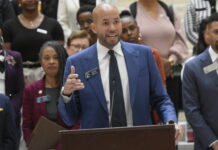
A federal judge in Atlanta struck a major blow against a Georgia law that bans people who boycott Israel from entering into contracts with the state.
Judge Mark Cohen ruled that the University System of Georgia violated the First Amendment rights of journalist Abby Martin in 2019 when it withdrew an invitation for her to speak at Georgia Southern University because Martin refused to sign a document pledging not to boycott Israel.
A 2016 law requires anyone who enters into a state contract worth $1,000 or more to pledge not to boycott Israel. Martin was to receive a $1,000 honorarium plus travel and lodging expenses. It’s a response to the Boycott, Divest, Sanction, or BDS movement, which urges people not to support Israeli businesses over its treatment of Palestinians. The movement has drawn new attention this month as video footage showing the aftermath of the latest round of attacks between Israel and Palestinians sparked new outrage.
The state’s lawyers filed a motion to dismiss the case, which Cohen rejected Monday.
“The certification that one is not engaged in a boycott of Israel is no different than requiring a person to espouse certain political beliefs or to engage in certain political associations,” Cohen wrote in his 29-page decision. “The Supreme Court has found similar requirements to be unconstitutional on their face.”
Cohen rejected the state’s argument that the requirement furthers the state’s interest by maintaining relations with an important national ally.
Attorney General Chris Carr’s office, the University System of Georgia, and Marietta Republican state Rep. John Carson, author of a similar bill, were not immediately available for comment.
The ruling does not strike down the law but makes its end essentially a foregone conclusion, said Anthony Michael Kreis, a constitutional law professor at Georgia State University.
“The next step is probably the court will strike down the law as unconstitutional and issue a declaratory judgment that says that the state can’t continue to enforce it, and then assess any monetary damages that (Martin) might be owed,” he said. “It’s kind of a weird gray space in the constitutional setting where the law has not been technically struck down, but the writing’s on the wall.”
The state could appeal the decision, said Partnership for Civil Justice Fund attorney Mara Verheyden-Hilliard, who represented Martin in the lawsuit along with the Council on American-Islamic Relations.
The decision also likely means the demise of a similar bill sponsored this year in the state Legislature to raise the threshold needed to trigger the law from $1,000 to $100,000, greatly decreasing the number of people potentially barred from state contracts and therefore reducing the state’s vulnerability to lawsuits.
That bill passed the House in March but was amended by the Senate just before the 2021 session expired, technically leaving it teed up for a vote in next year’s session. Lawmakers could decide to pass it, but it will likely never take effect, Kreis said.
“It may very well happen, but I would say it’s pretty much, constitutionally speaking, it’s dead on arrival,” he said. “The unconstitutional condition of attaching that requirement doesn’t suddenly become acceptable once the monetary threshold is raised to $100,000.”
Atlanta Democratic state Rep. Becky Evans filed a bill in March to repeal the state’s BDS law. Her measure did not gain traction in the Legislature.
Similar laws have been struck down in states including Texas, Arkansas, Arizona, and Maryland.







